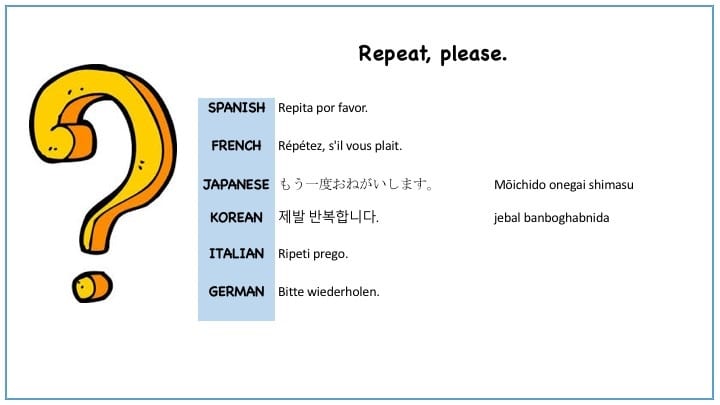Whether you’re practicing conversational French, Spanish, or another language, chatting with a native speaker can be daunting. Here, language tutor Jinky B. shares some tips to keep in mind if you’re feeling lost…
Congratulations, you have been taking language classes and diligently studying all that you have learned on your own time. Now you’re ready to go out and have a conversation with a native speaker. The conversation is going well and everything is flowing when you suddenly realize that, well, you’re lost! You feel as though you’re hearing a completely foreign language.
First of all, breathe! Here are three things you can do when you are starting to feel like you’re at your first language lesson, unable to understand anything the other person is saying.
1. Listen for context clues.
Think about what you are finding difficult to understand. Is it a single word? Is it a whole phrase?
Some languages are filled with homophones, words that sound the same but have completely different meanings. Once you hone in on that, think about the context of the conversation. If you’re talking about weekend plans to go to a picnic, think through everything else that was said prior to the misunderstanding.
- In French, la mer (the sea) and la mère (the mother) sound nearly exactly the same. Think about whether the speaker is talking about a trip to the beach or describing his family.
If it’s an entire phrase, it might be an idiom, one that is more common knowledge to the native speaker so it might not make sense to a language learner.
- In French, the idiomatic expression Il pleut des cordes does not actually mean that it’s raining rope, but that it’s raining a lot.
Regardless of whether it’s a word or an entire phrase, try to determine the meaning based on the conversation.
See also: French learners, take a look at these additional tips for translating French to English.
2. Ask for repetition.
When in doubt about what you have heard, ask the other speaker to repeat the word or phrase in question. Sometimes hearing the specific word might bring an epiphany to the unknown word(s). Below are some phrases in our most popular languages to ask “Repeat, please.”
Spanish: Repita por favor.
French: Répétez, s’il vous plait.
Japanese: もう一度おねがいします。 (Mōichido onegaishimasu)
Korean: 제발 반복합니다. (jebal banboghabnida)
German. Bitte wiederholen.
See also: Check out additional Spanish phrases to use here.
3. Relax and be honest.
Take a deep breath. Politely let the other person know that you are having trouble understanding. If you aren’t honest with yourself, you’ll find it difficult to follow and participate in the conversation.
And if you aren’t honest with your language partner, they will continue the conversation. Below are ways that you can use to indicate to the other person “I’m sorry. I don’t understand.”
Spanish: Lo siento, no entiendo.
French: Je suis désolé(e), je ne comprends pas.
Japanese: ごめんなさい。わかりません。(Gomen’nasai. Wakarimasen)
Korean: 죄송 해요. 이해가 안되는 데요. (joesong haeyo. ihaega andoeneun deyo)
Italian: Mi dispiace. Non capisco.
German. Es tut mir leid. Ich verstehe nicht.
See also: 11 Tips for Improving Your Conversational Spanish [Infographic]
Language learning is the same across all languages. You build a foundation of vocabulary and grammar. You learn to put those words together to form sentences. You perfect your accent and comprehension skills. Then, you venture out and practice what you have learned.
Don’t stop at your first obstacle. Just relax and remember to listen for context clues, ask for repetition, and be honest with yourself. Most importantly, have fun! The best way to learn is to enjoy the process.
Want more conversational Spanish or conversational French practice? Sign up for one of our online group classes, or check out our other blog tutorials!
 Post Author: Jinky B.
Post Author: Jinky B.Jinky B. teaches French and ESL. She has her Bachelor’s of Arts in French, French Literature, and Psychology from Florida State University and has more than five years of teaching experience. Learn more about Jinky B. here!
Photo by Brian Roberts
Suzy S.




